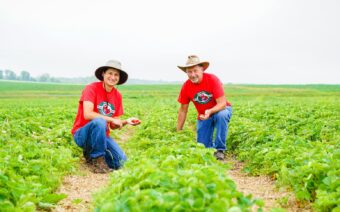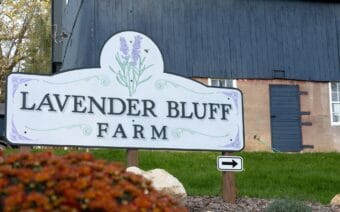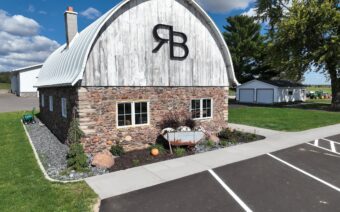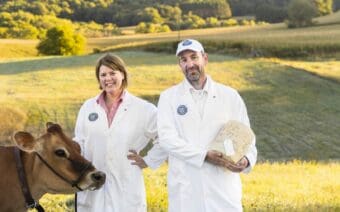
June 24, 2024
ELLSWORTH – According to the Wisconsin Department of Agriculture, Trade and Consumer Protection, agriculture contributes $104.8 billion annually to Wisconsin’s economy.
Not only is Wisconsin home to more than 6,000 dairy farms, but it is also the leading producer of cranberries, soybeans, potatoes and ginseng.
Farmers are required to be on call 24 hours a day, seven days a week, 365-plus days a year.
They plant, fertilize and harvest crops; milk cows; feed, tend to and herd animals; operate farm equipment; complete farm maintenance; etc. – serving as the backbone of the country’s food supply chain.
Farmers, however, also deal with financial challenges, demands of the job, isolated working environments, market volatility, labor shortages, increased global competition and unpredictable weather conditions – stressors that can fuel depression, anxiety, tension, stress etc.
According to a 2018 survey conducted by the National Farm Medicine Center, which is headquartered in Marshfield, 29% of farmers suffer from depression, and 35% suffer from anxiety.
Farmers make up 1% of the state’s population, yet, according to the Division of Suicide Prevention at the Medical College of Wisconsin, account for 2% of suicides.
Furthermore, the National Rural Health Association said the suicide rate among farmers is three-and-a-half times that of the general population.
It is these statistics and a tragic personal connection that have fueled Ellsworth native Jennifer Webster’s efforts toward supporting her fellow farmers and helping remove the stigma surrounding mental health.
Hits home
Webster said mental health well-being and the suicide rate amongst farmers aren’t conversations she ever thought she would be involved in.
However, that all changed when she lost her father, Brian (58), to suicide last August.
Growing up on her family’s dairy farm, Webster said she spent her whole life watching her dad put all he had – financially, physically and emotionally – into the farm, never showing any of the struggles he was battling.
“Everyone relied on my dad,” she said.
Though her father loved farming, Webster said the stress and depression that accompanied it eventually became too much for him.

“The amount of labor involved with any facet of agriculture – you have to be there around the clock,” she said. “Farmers don’t get breaks, and it’s easy to fall into a hole of isolation, depression and anxiety – a lot of the things that happen in agriculture, you can’t control – like weather and prices. It takes a strong-willed person to show up for it every day.”
Webster – a logistics specialist with CHS Inc., an agribusiness owned by farmers, ranchers and cooperatives across the country – said it’s easy for farmers to have the mindset of “I need to keep working, and I’ll be okay.”
“That’s how we were raised – work harder and you’ll be fine,” she said. “Research has shown that does not work.”
Though it’s hard for her to make sense of her father no longer being here, Webster said losing him to suicide ignited something inside her.
“Even though I’m still grieving the loss of someone I deeply cared about, it makes me want to work that much harder so this doesn’t happen to someone else,” she said. “There are a lot of people who suffer in silence, and you would never know what’s going on with them – obviously, my dad was one of those people.”
Since her father’s death last year, Webster said she has made it her mission to break down the shame associated with mental health and give support to others she didn’t know her father needed.
Inspiring change
The first step of eliminating a stigma, Webster said, is first recognizing it exists.
“There is a mental health crisis in agriculture,” she said.
Instead of grieving alone, Webster said her family became advocates for raising awareness of depression and suicide among farmers.
This, she said, included starting a western Wisconsin chapter of the Farmer Angel Network – a nonprofit organization focused on mental wellness and suicide prevention within the agriculture industry.
The organization, Webster said, helps remove the stigma associated with talking about mental health and helps farmers understand it’s okay to seek help.
“It’s important to have an organization that says, ‘we hear you, we understand you and we want to help you,’” she said. “Farmers need to know it’s okay to talk about it, it’s okay to get help and it’s okay to be on medication – it’s okay to not be okay.”
One of the main focuses of the Farmer Angel Network, Webster said, is bringing resources to farmers in need – which includes counseling services, support groups and educational resources.
“I think it is important to get the word out there about the resources available to them,” she said. “I am hoping it will continue to reach more farmers and help them feel comfortable about getting help – because if we keep talking about it, the easier (reaching out) will become.”
Webster said she has been working closely with those who started the Farmer Angel Network in southeastern Wisconsin to learn how to best support the farming community on Wisconsin’s West Coast.
And though the western Wisconsin chapter only has a few months under its belt, she said it is already making connections.
“We’ve created a bunch of promotional items we’ve given away at various events throughout the area – I would say we’ve given away more than 400 T-shirts to help spread awareness,” she said.
Webster said the organization hosted its first speaker – Jeff Ditzenberger, founder of the Talking, Understanding, Growing, Supporting (T.U.G.S.) program for mental health – at Ellsworth Middle School earlier this year.
“He spoke about mental health and how to deal with it,” she said. “We opened that up to the community, and we had more than 130 participants come.”
Webster said the Farmer Angel Network has also developed a strong partnership with Western Wisconsin Health in Baldwin.

“We had a luncheon with them in April to address the upcoming stressors (of the agriculture industry) – such as time crunches, weather issues, etc.,” she said. “It’s also a good partnership to have with local medical care staff.”
Serving as president of the Farmer Angel Network’s western Wisconsin chapter, Webster said she hopes to “do even more” in the future to help them cope with the different stressors the agriculture industry brings.
“We’re hoping to, in the fall, maybe bring lunches to farmers in the field,” she said. “I’d like to find people who can be release milkers to help farmers get time off – whether that means they can go out to dinner with their family or get off the farm for a bit.”
Making waves
Webster’s efforts to support farmers and bring the Farmer Angel Network to the region were recently recognized by the Wisconsin Farm Bureau – which named her a Heroes of Hope finalist.
The Heroes of Hope program recognizes individuals who support others during challenging times and make a positive impact within the agricultural community.
Being nominated, Webster said, helps shine a light on the importance of removing the stigma of mental health in the farming industry.
“Being recognized by the Farm Bureau and seeing our work being recognized is touching to me because sometimes I feel like I haven’t done enough,” she said. “I feel like we’re (just) scratching the surface, which means there is more work to be done, and I can’t wait to be part of it.”
Having the bureau recognize the mental health crisis within the agriculture sector and supporting people who are addressing it, Webster said, will hopefully help organizations like Farmer Angel Network reach more farmers.
“Even though we just started this organization, we’ve already touched people, and to me, that’s inspiring,” she said. “There are times when you think you aren’t making a difference – I know I’ve felt that way before – and then all of a sudden, somebody says, ‘thank you for talking with me,’ and seeing the impact that has, means a lot.”
Though everyone is busy in today’s society, Webster said she encourages everyone to “check in on their people.”
“You never know what someone is going through,” she said. “A simple conversation of ‘how are you?’ can go a long way. Take the time to slow down and appreciate the people who live next door to you or in your community. Making those connections – whether it’s physically going to see someone, sending a text or making a phone call – can make all the difference.”
Webster said her brother Tommy says it best – “No one farms alone.”
Check out the Farmer Angel Network of Western Wisconsin on Facebook for more information.
 Forest Lake Country Store undergoes rebrand
Forest Lake Country Store undergoes rebrand Old Station 31 Spirits – defined by family, tradition, service
Old Station 31 Spirits – defined by family, tradition, service








